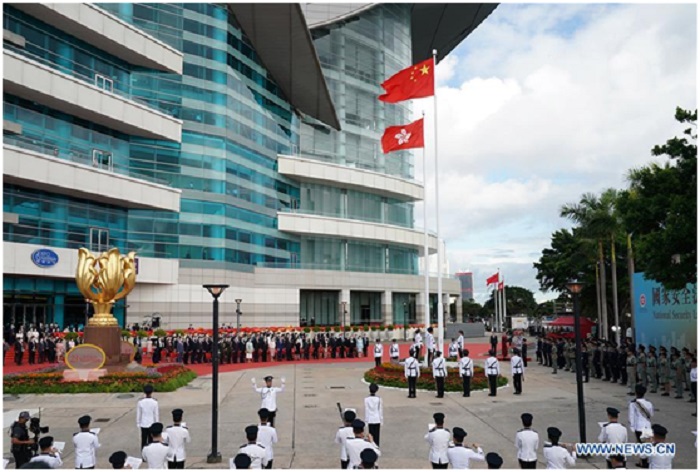



People’s Daily
The Law of the People’s Republic of China on Safeguarding National Security in the Hong Kong Special Administrative Region (HKSAR) adopted on June 30 by the Standing Committee of the 13th National People’s Congress (NPC), China’s top legislature, has established a seawall safeguarding the long-term prosperity and stability of Hong Kong.
Listed by the NPC Standing Committee in Annex III to the HKSAR Basic Law, the national security legislation is expected to terminate the region’s long-standing “unguarded” condition in national security after being applied in the HKSAR.
Since the disturbance related to the now-withdrawn ordinance amendments concerning the transfer of fugitives in the HKSAR in June 2019, “Hong Kong independence” forces, radical separatist forces, and the opposition in the region have grossly trampled on the rule of law and social stability of Hong Kong, inflicted heavy losses on its economy, damaged its business environment and international image, and undermined foreign investors’ confidence in the HKSAR.
With international agencies constantly downgrading Hong Kong’s credit rating because of its social unrest, the region lost its title as the world’s freest economy, which it had maintained for 25 consecutive years. Besides, the city’s ranking among global financial centers has also dropped to the sixth.
The region logged an 8.9-percent year-on-year slump in its GDP in the first quarter of the year, representing the sharpest quarterly decline on record.
In addition, the HKSAR’s unemployment rate rocketed to 5.9 percent in the period from March to May, a record high in 15 years. It is the reality Hong Kong faces.
Safeguarding national security is the foundation and a prerequisite for Hong Kong’s prosperity and stability.
The rapidly evolving situation in the region during the past more than a year has fully demonstrated that prosperity and stability is totally out of the question without the guarantee of national security.
It must be understood clearly that legal loopholes regarding national security have cost Hong Kong society dear.
Because of the lack of national security legislation, Hong Kong has witnessed in pain how the “Hong Kong independence” forces, black-clad rioters, and home-grown terrorists who threatened “mutual destruction” have kept escalating their violent activities at various locations, and secessionist, subversive, collusive, and disruptive practices have been conducted so unrestrainedly.
The efforts of China’s central government to plug the loopholes in safeguarding national security in Hong Kong, stop violence and curb disorder with effective measures, and restore the region’s sound legal and business environment are not only in line with the common interests of all sectors of Hong Kong society as well as foreign investors in the region, but also important guarantee of Hong Kong’s status as a global financial, trade, and shipping center.
Only with a solid foundation for national security and overall social stability can a country create better environment and greater room to address deep-seated problems and issues troubling economy and people’s livelihood.
When Hong Kong was confronted with severe challenges in safeguarding national security and was unable to complete relevant legislation on its own, the central government took decisive measures to establish and improve the legal system and enforcement mechanisms for safeguarding national security in Hong Kong from the state level.
The endeavor has been not only absolutely imperative for the prevention and control of national security risks, but also the fundamental solution to problems undermining the long-term prosperity, peace, and order of Hong Kong.
Hong Kong could never return to the right track and restore order if its legal loopholes in safeguarding national security remained, weak links in the system not improved, and the main dangers obstructing its long-term prosperity and stability not eliminated.
It can be predicted that with the introduction of the new national security law, which defines a clear bottom line of national security and explicit standards of right and wrong, Hong Kong will see less confrontations and internal friction stirred up by people with ulterior motives, so that the whole society can focus efforts on development in an easier manner.
The introduction of the national security law brings Hong Kong citizens the freedom of enjoying a peaceful life without concerns about the threat of black-clad rioters, the freedom of safe business operation, and the freedom of safe trips to office and school.
By guaranteeing a stable environment, putting an end to the social unrest, boosting market confidence, bringing the city into the right track, and setting a bottom line of national security, the new law means to the SAR the hope of solving deep-rooted social and economic problems including the housing woes, brighter development prospects for various sectors, and greater roles of the advantages of the “one country, two systems” principle.
Far-sighted personages in Hong Kong have pointed out since the onset of the legislative procedures for the national security law that the region is about to move from chaos to order.
Chief Executive of HKSAR Carrie Lam has also noted that restoring order and confidence is crucial for a fresh start of Hong Kong economy.
It’s believed that with the newly adopted national security law for Hong Kong and the firm support of the central government, the SAR will soon stop violence, end the chaos and restore order.
With its efforts focusing on construction and development after the introduction of the new law, Hong Kong will be able to make full use of the institutional strengths of the “one country, two systems” principle, make the most of major opportunities brought along by important initiatives such as the Belt and Road Initiative and the development plan for the Guangdong-Hong Kong-Macao Greater Bay Area, rebuild its advantages while integrating itself into the overall development of the country, and continue to create new development legends.


The Humanitarian Service Diamond Awards has.
A Chinese Company, Inner Galaxy Steel.


The Programme Coordinator, Regulatory, Compliance and.


A Non-Governmental Organization (NGO), Committee for.
The Trustfund Pensions Limited has chided.


The House of Representatives Committee on.
The China General Chamber of Commerce.


Senator Chuka Utazi who represented Enugu.


An Abuja based Legal Practitioner, Ugochukwu.


The African business community in Yiwu,.
Leave a Comment